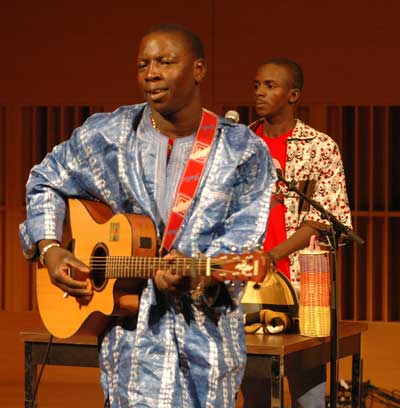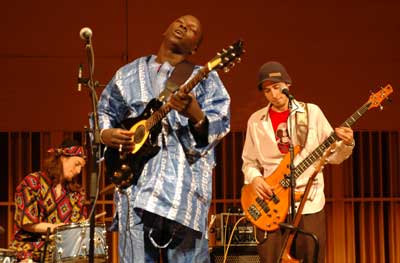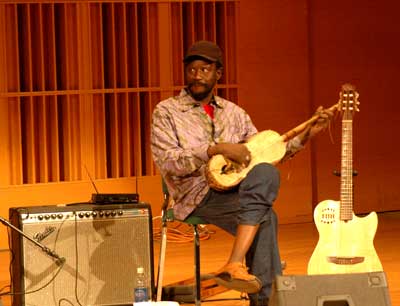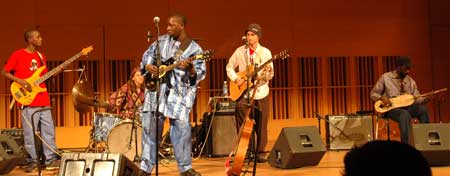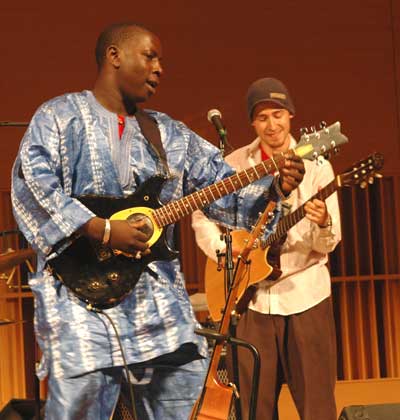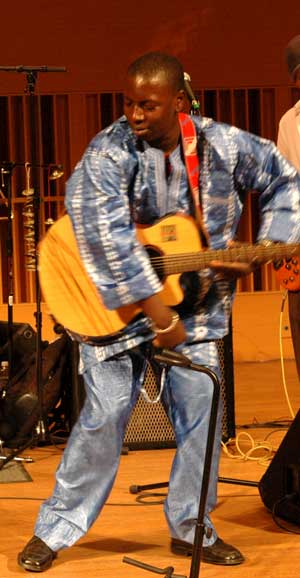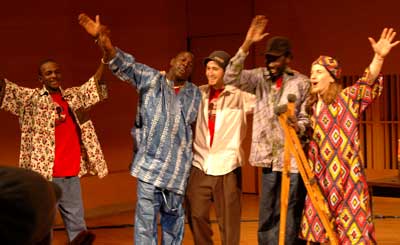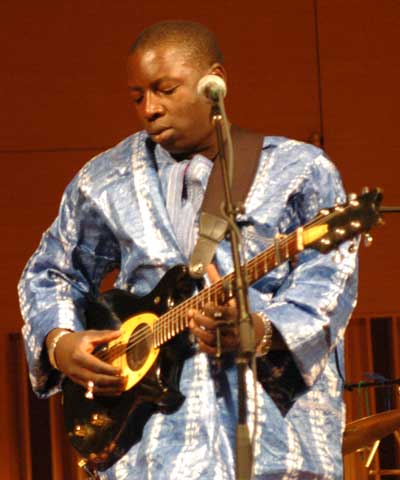Afropop Worldwide’s Banning Eyre and Sean Barlow interviewed Malian guitarist and singer Vieux Farka Touré the day after his U.S. debut concert at Wesleyan University in Middletown Connecticut on Februray 4, 2007. Here's the text of their interview. Photos by Banning Eyre.
B.E: Welcome to Afropop Worldwide. Tell us a little bit about your story, where you were born and grew up, and how you became a musician.
V.F.T: I was born in Niafunke in 1981, but I didn't grow up there. I grew up with my uncle, that
is to say Ali's younger brother. He was in Youwaro. And he worked for “le levage,” he was the chauffeur for le levage. So I grew up there in Youwaro. That's in the region of Mopti.
Afterwards in 1993, 1992, I returned to Niafunke. I had been visiting there once or twice a year. So I returned in 1993. I was 11, 12 years old. So I returned there to continue my school right up to ninth year. After ninth grade, it was time to decide. My father asked if I wanted to I go in the army? At first, I said okay.
B.E: Why did he want that for you?
V.F.T: I think it was because I have a hot temper. At the same time, my namesake was a soldier, part of the national army, his father, Ali's father. He was from the national force. So since that was my namesake, he wanted me also to go into the army. LAUGHS.
B.E: That was his father, your namesake?
V.F.T: Yes, Ali's father.
B.E: And since he was, he thought you should be.
V.F.T: Voila. So it was my father who chose the army for me. I never wanted that. I don't like the army. Because in fact, I had started playing music since the time I lived in Niafunke, since 1994. That was the moment I came in, little by little, learning with people. 1994, 95, 96. I became the principal drummer in the group.
B.E: What group?
V.F.T: The Orchestra of Niafunke. The percussionist. So I stayed there for a while. In 1999, my father said, "Okay, now you are going to Kati.” He had a friend there who had a farm. Ousmane Maiga. He had died in an accident in Bamako. So I went there to be with them. I spent a year there. I did my work. After that, I spoke to my landlord, who was my friend. I told them I really wanted to go to INA, the National Institute of Arts, to continue my music. As he was very nice, simple men, he said, "No problem." He was the one who prepared my dossier. We had a correspondence with INA. Then he said, "Oh, if you leave me, what am I going to do?" And Ali was not really angry. He was never angry. He just wanted to make sure that I really didn't want to go on the army, and I said no, I really didn't. So I started, one year, two years. Then I told him I really needed a guitar.
At first, he didn't want to say yes, but he couldn't reject me. So he got me a nylon string guitar. That was my first guitar. And he said, "No problem." So that was cool. Already, he saw that I was moving quite quickly. I learned quickly, it in fact I worked a lot with the guitar. Very hard. I started by figuring out where to put my hands, getting to know the neck of the guitar. Afterwards, when I started to make my way bit, I had a cassette player and some of Ali's cassettes. I tuned the guitar the way he does, the same tuning. And I played along with the radio in the cassettes.
B.E: You didn't have a teacher for that stuff?
V.F.T: No, a teacher, no. I wouldn't say that. There were people who showed me two or three things here and there. Like Afel Bocoum, my cousin. Each time I went to Niafunke, for vacation, he gave me all this time. Every morning he came to teach me. . There was also the young guy who works with Ali, Mamadou Kelly. We played together every time. Every time he played with Ali, he was there. We would take guitars, two guitars, and he would say, "Let's play." So that was good.
B.E: Before we go on, a question about the past. You explained how you resisted Ali's desire that you go into the military. But I know from many conversations with Ali that, the military aside, he had his doubts about the profession of music. Did he ever try to convince you that maybe you should do something other than be a musician?
V.F.T: Yes, yes. That was always. "Ah, son, music is not good. The people are not good. They are not honest. I would prefer you do something better." No, no, no. [LAUGHS] And I would say, "But no. Everyone has his life. Everyone does what he has to do." Finally, he understood.
B.E: You were clearly inspired by her father, but who are some other musicians who inspired you?
V.F.T: In fact, I listened to lots of music. Lots of music. I listened to Salif [Keita], to lots of American musicians, John Lee Hooker, BB King. The blues. I listen to a lot of blues. Ali and I loved the same music in fact. Because he loved the blues, and with me, it's the same thing. We listen to the same music.
B.E: So, you've got this guitar, and you are studying at INA. What comes next?
V.F.T: Okay, that doubled my edification. I was required to put in 100 hours. And in fact that putting 200 hours. It was really in 2000 and 2001 that I started playing guitar. It's not such a long time, but in fact, I meet people who complain for 10 years or more and they come to me to learn. "Please, teach me." But I don't know anything.
B.E: And you had just learned picking up things here and there?
V.F.T: Yes, Afel and Mamadou. But I also learned things in school in Bamako . It was there I started to really learn music, even the guitar. First year, second year, and I got the guitar. It was the second year that Ali bought me that nylon string guitar, and then the third year, a friend of his also sent me a guitar. It was an acoustic guitar, nice one. Steel strings. He saw that I was advancing, so he sent me that. So I added little by little. In my fourth year, Ali and I made a trip together to Privas in the mountains of France. That was my first time to travel with him. Just him and me. That was actually the first time I left Africa. Around 2003. And he was when we were in Privas that he bought me the guitar I'm playing today, this Yamaha.
B.E: So now he had confidence in you.
V.F.T: Voila. Yes, that's when he started. "Before I was pushing you like that. Now I will push you like this." And from there, I started learning everything. Left hand. Right hand. It was around then that I met Eric Herman [the producer of Vieux’s self-titled debut album].
B.E: 2004?
V.F.T: 2003. I was giving some lessons and guitar to his friend Alec. So Eric came by my place. These were paid lessons. And he did two or three hours a day, I was teaching these young guys who would come from the US. I learned you could make money teaching. [But he taught Eric on the side a bit, informally. Out of friendship.]
Then Eric came again talking about this compilation he wanted to make. I said, "Okay. All right. But I know nothing. Would you want me to do on this Malian compilation?" At the time, I didn't know anything. I was still at INA. In my fourth year, the last year.
B.E: When you were at INA, did they teach you stuff about how to have her career, the business of music, things like that?
V.F.T: Yes, yes, yes. They did have that kind of course.
B.E: So you had quite a broad education, didn't you? Both in the traditional music and in all these different styles, international styles.
V.F.T: Yes, I had a bit of styles from everywhere, but everything was really based on the style of my father. That was my basis. But I have my own style now. And now, I'm trying to blend the two styles. That's what was happening on this album that I have just done. I have my own style, and Ali’s style, and it works that way. I try to balance the two. If everything goes well, this should make for a good road. It was never required that I learn Ali’s style. No. I wanted to have my own style. But I felt obliged personally to know his style, because that's just how it was.
B.E: You had a unique opportunity. Why not learn from it?
V.F.T: That's it. So, with this compilation, I said, "Eric, what are we doing with this what you want me to do?." Ali didn't know what I was doing. He said, "You are crazy. You should make your own record." And then he said nothing. So, as Toumani [Diabate] was my godfather…
Tim Keiper, Vieux Farka Toure, Eric Herman
B.E: So playing Mande music was something new for you?
V.F.T: My father had showed me a few things, but not like Toumani. The small amount of time that I spent with his group there, playing…oh no…. That was everything. Magnificent. It was really cool.
B.E: So this is 2005?
V.F.T: 2005, 2006, even 2007. That was when we made the recording. The recording was made a long time ago. When that came to make the recording, I was sort of playing with Toumani's group. It was Toumani who said to Eric, "So do you want to work on this compilation, or do you want to make a record for Vieux?” That was when he decided that it would be better to make a complete record. And he came back to the , and I took the time here in to really get prepared, really well prepared.
Mama Cissoko
B.E: Was this the first time you composed songs for yourself?
V.F.T: No, I was always creative. In my room, I was sat down and picked up my guitar and made something up. And I have an idea what kind of music it was. This is for crazy people. This is for sick people. This is for nice people. Like that. Then I would just look for some words to sing, without writing anything down, just like that. It's a matter of luck in fact. It's only when I finish and have everything in my head that I write it down. I composed everything. I work it all out in my head. It becomes very clear. Then I write it.
For example, there's a song on the record, “Sankare.” He's my uncle. The young brother of Ali. In fact his family is my family now. He had the confidence of Ali. He's a person who is very clear. So this is a homage to him.
B.E: So you are griot now?
V.F.T: No, I am not a griot. In fact this song was created in the studio.
B.E: At Studio Bogolon?
V.F.T: Yes. We put down the bass, we put down a few things. And I just did that directly. It turned out to be one of the best songs on the album.
B.E: Let's talk about a few of the other songs, like "Dounia?”
V.F.T: “Dounia” is life. Me, when I made that, a lot of people thought it was for my father that I had made it. When I made that, my father was still alive. But it was through everything that he taught me that I made it. Everything he taught me about life, everything he gave me, all that went into that title. Because Dounia is life. It's the world. Is everything. Nothing is ever eternal. We will all pass one day. You can never do everything in life. If you give someone one frank, it's not too little. If you give someone a million, it's not too much. It's not how much you give. It's what you do.
V.F.T: “Ana” is my little sister. I love her well. Every time I go to Niafunke, she's the one who was there, she prepares. She looks after me, she washes my clothes. She's just 15 years old, my sister. So I made that song for her.
B.E: And the music. It turned into a reggae song, but didn't start that way?
V.F.T: In fact, I did not change the manner of the music. In other people who forced music to change. They want to change it to something else. But I said no. I like it that way. Someone said, “I like that song, but I want to change the rhythm.” I said no.
B.E: But when you wrote the song…
V.F.T: It was like that. You say reggae. Someone says the song is reggae. I say it is what it is. If it comes from reggae, or it comes from rock. As long as it works with the music. You say. I mean if you try to do something that doesn't work with the music, if you take a reggae song and try to sing rock inside it. It doesn't work.
B.E: I suppose it depends. Some music is more open than others.
V.F.T: But you have to do what the music demands.
B.E: Let's talk about the song “Wosoubour”.
V.F.T: “Wosoubour.” That is to say, "I'm sorry." It's a little bit like that. There are many people who don't do their job. They're people who want to get involved with things they don't understand. Whether they're criminals, or just people who don't know, or gossips, people like this cause a lot of trouble in . It's not good. Why talk about others? You have a job to do. Looking yourself, and follow your own road. Stay focused on your own job. Why go among others to make mischief. Or okay, they want to go right away to someone, and say, "Oh, Sean, how are you? I'm okay. You know that Vieux is not good. He took this. And he did that." And then he asks if he can have something from you. It's not good. So the song is to really say the people be real. Be clear. Do it you have to do, and leave the rest.
Me, I have no friends in Mali. Eric saw this. Me, if I'm not in my room, I go out with my car, I do what I have to do, I come back. Period.
B.E: You have no friends in Mali?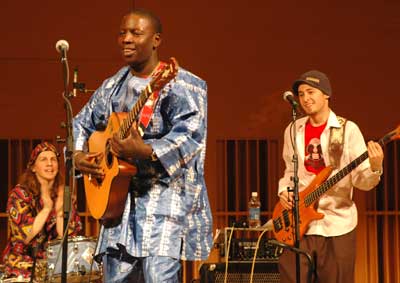
V.F.T: No, no friends. Not like that. No friends to hang out with all the time. We are confidants. We talk about everything. No. Not like that. I have no need.
B.E: You don't trust that.
V.F.T: No. It's not that I don't trust it. But what I'm looking for “la tete en fait.” Today, there are many who you think are your friends, but in fact they are not your friends. They want to use you for something. So it's something like that. That's why I don't go out. People come sometimes. Everyone comes. Young people come. Acquaintances. We discuss things. We talk a little. But my affairs, I don't discuss that with anyone. My friends are Toumani and when I go to England, Nick Gold. You see? I prefer to have people on the outside as my friends than those back home.
B.E: You have two songs here that Ali played on. “Tabara” and “Diallo.”
V.F.T: Yes. “Tabara” is actually a song that Ali taught me. We were at Lake Debo when he taught me that. I went to Niafunke and found him, and we went there and were in a pinasse. That was when he taught me that song. On Lake Debo.
B.E: So, did he want to play on this song, or did you invite him?
V.F.T: Well, it was perfectly normal and he played on my album. That was normal.
B.E: And “Diallo?”
V.F.T: On “Diallo” the singing is Ali’s. The rhythm is mine. In fact, for me, this is really his signature. There is no song of Ali's here if not for “Diallo.”
B.E: He plays with incredible force on the song. It's really impressive.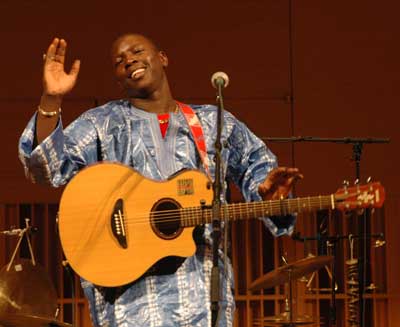
V.F.T: Voila. And that is something that he has done before. That people know already. It's a signature that he puts on my work. For us it's a signature. Everyone knows this as a song of Ali's that I have put among my songs. I have to do a few songs come from him.
B.E: Someone told me that these were his very last recordings.
V.F.T: For sure, for sure. Because today he left… Even that day, when he came, we had to hold and so that he could walk. He said, no, he had to do it. He had to play. When he came home to the house that night, he lay down, and he couldn’t get up again.
B.E: So these two were recorded in one session?
V.F.T: Yes. At the same time. In fact there is a third one. We're saving that one for the second album. [The third track actually appeared as the title track on Vieux's 2011 CD, The Secret.]
B.E: One thing that interests me about this album is the way it is arranged. It's different from all the other records I've heard from . Their introductions. There are instruments that enter only in the middle of the song. There are places where all the other instruments dropout featuring one instrument. This is pretty typical in American music arrangements. But we don't hear that very much in roots records from .
V.F.T: Yes. Me, I made my arrangements. But it was they who mixed the record. Mostly it was Eric who mixed the record. But each time he made a mix, he sent me a copy, and I listened. It was good, I would say, “No problem.” If it was not, I would say, "Take this out. Put this in."
B.E: But you are happy with the result?
V.F.T: Yes, for sure. Because there is nothing on the record that I did not pass on.
B.E: Do you hear what I mean that there's something here that has been missing in a lot of Malian records? There are some great performances, but not usually this kind of arranging.
V.F.T: No, over there, as far as arrangements go, people don't look very far. You know, over there, people record everything at the same month. You start recording on the first, the second, third, fourth, the fifth. You are finished. The seventh, the eighth. The promotion starts at the same time you're still doing the mix. You see? Before the 20th are the 30th, the record is out in the market. That's not an arrangement. That's not a mix. Mixing as one day, this, that, this. And it's finished.
B.E: Is this record out in now?
V.F.T: Just now. It is coming out in at the same time as it comes out here.
B.E: And there is a video?
V.F.T: Yes, but that is not out either. Not yet.
B.E: So the Bamako public has not really heard your work yet, right?
V.F.T: That's right. They have yet to discover me. They've heard rumors. "He's made a record. It's very good." But I think this album is going to impress them. And then I think the remix album is the one that's really going to impress them. That is going to impress them, because nobody has really done at remix in Mali.
Vieux plays his father's trademark black guitar
B.E: So now, you are part of an even bigger conversation.
V.F.T: That's it. That's it. I'm really happy with them. That's the thing that has really impressed me. The remixes. You go to Bamako , and there are some people who really like our show. But then some will say this is the music of old people. So now they would hear the music of all people, and the music of youth. Now we have both. If you listen, you'll hear that.
B.E: Let's talk about the tour. If you could have any group you wanted on stage, what would you use? Would it be a big group?
V.F.T: No, no, no, no. I have never wanted to play with a lot of musicians behind me. I don't like that. Even if it was possible, I would just like three people.
B.E: Guitar, bass, and drums?
V.F.T: I would have an accompanying guitarist and calabash. Period. You know how music is when you begin. You have to start well, in fact. For example, with Ali, if he went just with his guitar on the stage, the people would love it. They love him. With me, it's not the same thing. I'm obliged to convince the public. Everything you do must be the best. So when I came, Eric said to me, "I found a drummer he's very good." And I said, "But can he play our music? It's not the same thing." He could play the bass, I had no problem with that. We brought Mama, the elder Mama Sissoko. Because you can't just have a group of young people. A group of just young people is not good. There has to be an old person who is wise, who can advise you. Who can say, "That is good. That is not good." He has a thousand times more experience than I do. This is someone who worked with my father. He knows, so I have need of someone like that. And I have always done this. I have always collaborated with people who were older than me. It's to have more experience, to get the benefit of their experience.
B.E: So you're happy with this group?
V.F.T: Oh, for sure. We rehearsed for one week. One week, five days, six days rehearsal.
B.E: The sound is strong, like electric blues for rock 'n roll.
V.F.T: Yes.
B.E: And it looks like you're very comfortable in the role of bandleader. Is this a new experience for you?
V.F.T: No. Even in , I have my own group. I have all the materials. I play with percussion, bass,
everything, another guitar. We play with eight people.
B.E: But you prefer smaller group?
V.F.T: Yes. For me. If someone says, "Come and play a concert with just three musicians." I'm happy with that. Even just now, on my way here. I played three concerts in France, just me. I was alone.. Just with my guitar. It depends what people ask for. If they want me alone, I come alone. If they want the whole group, we go. But this group here, I really want to keep this group. The five of us. We don't need to add anything.
B.E: Okay, before we come to the guitar, alas you a philosophical question. Your father was legendary in many ways, but I think the most important thing he did was to give the world the music of northern ? This music is known now, but when he started, it wasn't like that. And for me, that was the most important thing that he did.
V.F.T: Yes, for sure.
B.E: So when you think of your life, what you want to accomplish?
V.F.T: I want to continue what he did. Just to continue what he did, even bigger, if possible. Because the music is question of luck also. It's luck. If it's possible. I will be happy if I can increase the power of what he did. You see? Because we can't do anything he didn't do. Well, maybe, but….
B.E: You are starting out young. You have a great opening through him. You are already doing a successful tour. This is very different than the way he began.
V.F.T: Voila. If a door opens before you, you must go through it. There are many keys, but you have to push on that door. If you don't push on that door, you'll just sit there in front of it. You see? So I'm trying to do everything. To continue, to promote the things that he did. But I'm not only about Sonrai music. I play the music of Mali. A little Mande, a little of everything.
B.E: And blues? Rock 'n roll?
V.F.T: That is my style. I like that.
B.E: So you don't see a big separation between these things?
V.F.T: No, not a big separation. With us, the blues, our blues, and the rock 'n roll here, the only difference is that in the rock 'n roll here, you hear Changa-changa-changa-changa. That's something else. A thing unto itself, rock 'n roll. You see? Me, what I do, I don't call it rock. My godfather in Mali, Toumani Diabate, says that my music is “Koroboro rock.” Koroboro is the Sonrai. That’s what the Bambara call the Sonrai. Koroboro rock.
B.E: That works.?
V.F.T: It’s something like that.
Sean Barlow: I saw your first appearance in New York , at the CD release party. What was that remix song came on right after you sang?
V.F.T: It was “Sankare.”
Sean Barlow: Can you talk about a couple of the remix songs that you especially like? [Tracks from Vieux’s album were sent by producers to remixers around the who remixed them. Remix album will be released later in the year. Some tracks have been made available as digital downloads. More info on afropop.org]
V.F.T: Yes, “Ana” is very good. And “Sankare.” It was “Ma Hine Cocore” and “Sankare” that really impressed me. When I heard these remixes, I said to myself, "What is that?" Because I've never really heard music like that. I don't know about this. So I said what is that? When I listened more, I said, "It can't be true. It wasn't us who did this. It was some devil." But you know, we could say that everyone has his job. That's the way I prefer to look at it. That's the truth. They've put something new into it that's never been seen before. You see? And that impressed me. And that's what I think will really impressed the young people in Bamako. Because they've never heard remixes like this. Never. No one has done remixes. Even the big ones
S.B: Issa Bagayogo?
V.F.T: Well, Issa Bagayogo, his music is remixed to begin with.
B.E: Salif Keita too?
V.F.T: Yes, Salif Keita, but we cannot say Salif Keita’s remix was a remix for the young.
B.E: It was a remix for the old?
V.F.T: [LAUGHS] That's right. A remix for the old. That's it. It's clear. But if were talking about a real remix for the young, that hits hard, if you listen, you will feel it. That's it.
B.E: One question about that song at the end of your show. That was a song recorded by Toure Kunda?
V.F.T: Yes, it was recorded by Toure Kunda, but they didn't do it that way. I changed the structure. It's the same words. The first time I've heard this song was not from Toure Kunda, but from Toumani.
B.E: Oh, yes, Toumani recorded it with the group Songhai.
V.F.T: Yes. I heard it in . So the song is not mine.. It's not my tradition.
B.E: But it is a traditional song, even before Toure Kunda.
V.F.T: Yes, it is not Toure Kunda’s song. That's clear. The end is in Bambara. “ Beni dan, beni sekou.” When one does his best, he can't do better. There's a point where you can't do better. When you get to that level, you've arrived. So that's not my song. I got it from Toumani. I can play Ali's things just as I play Toumani's things. Toumani is my godfather. I will do something I learned from him in every concert.
S.B: Why do you think Malian musicians are so dominant in the international Afropop scene? For example, there are approx. 130 million Nigerians, 12 or so million Malians, but there are many more Malian artists recognized internationally
V.F.T: Malians work hard. When you talk about people like Ali and Oumou [Sangare], Salif, these are clearly people who work hard. They work on their music. You see? Because music is what? What you love, others will love. What you don't love, others will not love. It's up to you to choose. When you talk about Toumani, Ali, Salif, these are people who've studied what they like, and worked hard. Music is not just playing what's in front of you and being finished. You must really ask what people want to hear. What instruments? You have to study people before you can make a success with them.
S.B: In March [2007], there will be a big ceremony for Ali with all the major Malian artists performing? Can you give us a recollection of your life with your father?
V.F.T: Well, me, I'm too close to my father. We had breakfast together every morning. It's not like here, everyone eating at a table. We ate every morning from the same play. I was so close to him. He told me many things. I was his friend. We went fishing together, hunting together. We did many things together. Any things. Sometimes we went to the garden, talking quietly. Or by the side of the river. We shared many things. And once we made it to work together in . We were alone on the stage. I played calabash and guitar. So if you ask me for an image of my father, I have too many.
B.E: Thanks so much, Vieux,
V.F.T: Thank you.
More information at: www.vieuxfarkatoure.com









